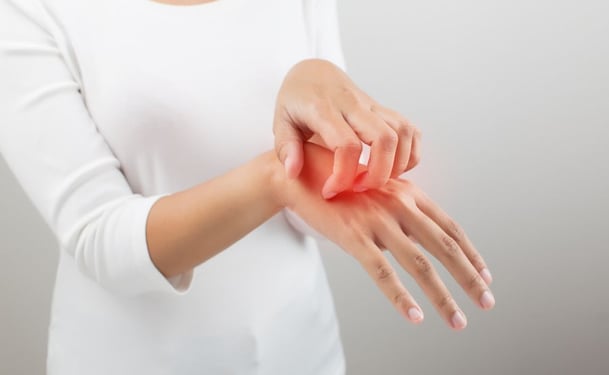Hand eczema causes moderate to severe itching and redness. Also known as dermatitis, this form of skin rash occurs as a result of self inflicted injury or repetitive physical activity. Hand eczema occurs in men, women and adults and children of all ages. Generally, the condition harms older age groups and not infants.
This type of dermatitis appears as a bright red rash on the tops or bottoms of hands. People generally realize or self diagnose the problem as an eczema rash after itching and inflammation do not settle or disappear. Many people suffer from itching, inflammation and undesirable hand appearance for extended periods of time when treatment is avoided or forgotten.
Contracting Hand Eczema
Hand eczema does not spread from person to person. However, this non-contagious rash does have the ability to spread to other parts of the body. Hand eczema usually develops in individuals who have suffered from previous atopic dermatitis on other regions of the skin.
This skin condition generally develops as a result of manual labor that involves the hands. The environment in which manual labor takes place plays a large role in the likelihood of developing hand eczema. For example, dealing with toxic or powerful chemicals, powerful soaps and hot water tend to cause more hand damage, increasing the likelihood of dermatitis. Likewise, any moisture that remains on the tops or bottoms of hands for extended periods of time can contribute to the development of hand dermatitis.
A lack of moisture also increases the chances of developing eczema. Cold conditions cause dry skin. A constant state of dry skin damages outer layers of the epidermis, generally leading to eczema like symptoms.
Treating Hand Dermatitis
Although individuals generally come to understand that an eczema condition exists before seeking medical assistance, dermatologists provide detailed and accurate information regarding nearly every skin condition, including hand eczema.
Dermatologists will either prescribe medication or administer some sort of treatment that will decrease the eczema's negative effects, while limiting the chances of future outbreaks. Developing technology such as UV light treatments help to treat skin conditions while limiting the invasive nature found in other methods.
Every patient will call for a slightly different treatment regimen depending on his or her condition. Severe hand eczema often requires multiple treatment sessions over extended periods of time. Once major treatments conclude, dermatologists use less powerful, but equally effective creams or lotions to help reduce eczema side effects.
Many dermatologists also recommend lifestyle changes to those who suffer from severe eczema conditions. Manual labor workers such as janitors, gardeners and landscapers tend to decrease the amount of work done, or increase the amount of care and special attention paid to hand safety.
Properly Diagnosing Eczema
A large number of people who suffer from undesirable skin conditions mistake eczema for psoriasis. Psoriasis acts much like eczema in that both cause dry, scaly skin. Eczema causes considerable itching and inflammation, unlike most common cases of psoriasis.
Consulting with a medical professional such as an experienced dermatologist serves as the best method for discovering and diagnosing hand eczema.



